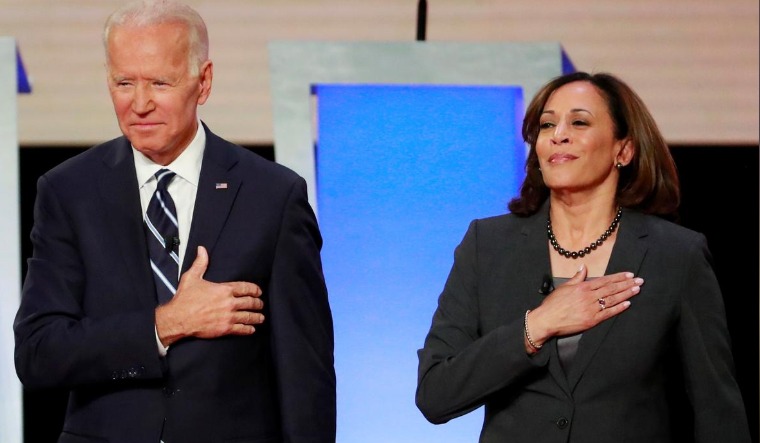There's a certain irony for India in Joe Biden and Kamala Harris becoming the next president-vice president of the United States (US). Harris is of half Indian in origin and while she doesn't shy away from her roots, she does use her African heritage (her father, Donald Harris was from Jamaica) more effectively. In a country where black votes count (this ethnicity makes up 13 per cent of the population) more than the one per cent Indian diaspora, the Black woman calling card is certainly stronger. Biden, on the other hand, has recalled the bit of India in his lineage— a certain great great great great great grandfather, George Biden, worked for the East India Company and had an Indian wife.
Biden, say observers, has had a soft spot for India. They recall his efforts as a senator to drop sanctions against India after Pokhran II and helped craft the important Civil Nuclear Deal, which is now the cornerstone of the bilateral relationship. Harris, on the other hand, is more critical in her outlook. Though personally, she didn't say anything about the Citizenship Amendment Act and abrogation of Article 370, she stood steadfastly by Pramila Jaypal, Congresswoman, who has been vocal. External affairs minister S Jaishankar cancelled a meeting with the House affairs committee as Jaypal was part of the delegation last year. "She didn't attend the Howdy Modi event in Houston either,'' points out a former spokesperson for the Ministry of external affairs (MEA) Vishnu Prakash.
However, in the immediate afterglow of the election results, these aren't the finer points that Indians are poring over. The thrill of having a person of Indian origin up there in the US eclipses a lot of other matters. In Tamil Nadu, especially, Diwali has arrived a week early.
Indeed, this is that one time when Indians might be awaiting the visit of a vice president with more anticipation than a presidential visit, itself. A visit in their term is almost a certainty, given the present strength of the bilateral, and the importance India has for the US in the Indo Pacific, the new world theatre. Both the last two presidents visited India in their first terms. Barack Obama made two visits, once in 2010, and then as chief guest at the Republic Day parade in 2015. Trump, who has had only one term, made the last overseas visit of his tenure to India this February. It was Bill Clinton's 2000 visit, the first in 22 years by a US president, that brought in a frequency in such visits, George Bush junior visited in 2006. Now, it is not surprising that the president visits in the first term itself, it's almost a taken. "And I won't be surprised if that visit happens in the first year of the presidency, itself,'' says Prakash. India and US upscaled their relationship to a Comprehensive Global Strategic Partnership during Trump's visit.
There have been eight presidential visits to India, with Obama being the only one to visit twice. These were were Dwight Eisenhower(1959), Richard Nixon (1969), Jimmy Carter (1978), Clinton (2000), George W Bush (2006), Obama (2010 and 2015) and Donald Trump (2020). Vice presidential visits, however, have been far fewer, with only four ones coming to mind. Nixon visited in 1953, and though there was no love lost between him and India, his was the first big visit from the US to the newly founded country. Vice president Hubert Humphrey visited India for the funeral of prime minister Lal Bahadur Shastri in 1966. George H W Bush then visited, 18 years later, in May 1984, that visited was overshadowed by the kidnapping of an American couple in Sri Lanka by Tamil rebels. Bush spent most of his time in negotiations, supported by Indira Gandhi. Biden himself visited as vice president in July 2013. Once he makes his presidential tour, he will be the only one after Nixon to visit in both capacities, as VP and POTUS.
While it may be early days yet, a Harris visit is likely, too. It is not just her Indian roots, but the deep engagement with India that should provide an opportunity for this.
What's in store for India-US relations under the Biden-Harris regime
Biden is more Indophilic than Harris
 Joe Biden with Kamala Harris in 2019 | Reuters
Joe Biden with Kamala Harris in 2019 | Reuters
📣 The Week is now on Telegram. Click here to join our channel (@TheWeekmagazine) and stay updated with the latest headlines
Read more
-

South Korean impeached President Yoon Suk Yeol indicted over martial law imposition
-

Barcelona superstar Pedri can become 2034 World Cup ambassador if he moves to Saudi: Report
-

Jackie Chan and Tony Leung Ka-fai reunite for new actioner 'The Shadow's Edge'
-

Revised Perplexity AI bid for TikTok US stake might give American govt part-ownership
-

How NVS-02 launch will propel India's spacefaring ambitions?





